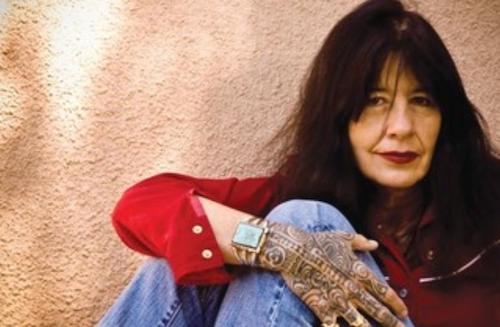Joy Harjo Awarded 2017 Ruth Lilly Poetry Prize

Today, we are excited to announce Joy Harjo has been awarded the Ruth Lilly Poetry Prize for lifetime achievement and contribution to the art of poetry. Of Harjo's poetry, Don Share remarks: "Her work is a thrilling and necessary antidote to false news, the ephemera of digital celebrity, and other derelictions. It pushes vigorously back against forgetfulness, injustice, and negligence at every level of contemporary life. Her work moves us because it is in the continual motion of bringing forward, with grace but also acuity, our collective story, always in progress." More about Harjo and the award:
Presented annually to a living US poet whose lifetime accomplishments warrant singular recognition, the Ruth Lilly Poetry Prize is one of the most prestigious awards given to American poets. At $100,000, it is also one of the nation’s largest literary prizes. Established in 1986, the prize is sponsored and administered by the Poetry Foundation, publisher of Poetry magazine. It will be presented at a ceremony at the Poetry Foundation on Monday, June 12th.
Joy Harjo was born in Tulsa, Oklahoma, and is a member of the Muscogee (Creek) Nation. She earned her BA from the University of New Mexico and MFA from the Iowa Writers’ Workshop. Consistently praised for the depth and thematic concerns in her writings, Harjo has emerged as a major figure in contemporary American poetry. Her work draws on Native American storytelling and histories, as well as feminist and social justice poetic traditions, and frequently incorporates indigenous myths, symbols, and values into her writing.
Her poetry inhabits landscapes—often the Southwest and Southeast regions of the United States, but also Alaska and Hawaii—and centers around the need for remembrance and transcendence. She once commented, “I feel strongly that I have a responsibility to all the sources that I am: to all past and future ancestors, to my home country, to all places that I touch down on and that are myself, to all voices, all women, all of my tribe, all people, all earth, and beyond that to all beginnings and endings. In a strange kind of sense [writing] frees me to believe in myself, to be able to speak, to have voice, because I have to; it is my survival.”
Harjo’s recent publications include the children and young adult’s book, For a Girl Becoming (2009), the prose and essay collection Soul Talk, Song Language (2011), the memoir Crazy Brave (2012), and the poetry collection Conflict Resolution for Holy Beings (2015), which was shortlisted for the International Griffin Poetry Prize. Harjo’s collections of poetry and prose record a search for freedom and self-actualization.
Harjo’s many honors include the Lifetime Achievement Award from the Native Writers Circle of the Americas, the Josephine Miles Poetry Award, the Wallace Stevens Award from the Academy of American Poets, the William Carlos Williams Award from the Poetry Society of America, and the American Indian Distinguished Achievement in the Arts Award.
In addition to writing poetry, Harjo is a noted teacher, saxophonist, and vocalist. She performed for many years with her band, Poetic Justice, and currently tours with Arrow Dynamics. She has released four albums of original music, including Red Dreams, A Trail Beyond Tears (2010), and won a Native American Music Award for Best Female Artist of the Year in 2009. She has been performing her one-woman show, Wings of Night Sky, Wings of Morning Light, since 2009 and is currently at work on a musical play, We Were There When Jazz Was Invented. She has taught creative writing at the University of New Mexico and the University of Illinois at Urbana-Champaign and is currently Professor and Chair of Excellence in Creative Writing at the University of Tennessee, Knoxville. Harjo is a founding board member of the Native Arts and Cultures Foundation.
Examples of Harjo’s poetry can be found on the Foundation’s website, where she is also featured in an interview with fellow poet, Layli Long Soldier.


